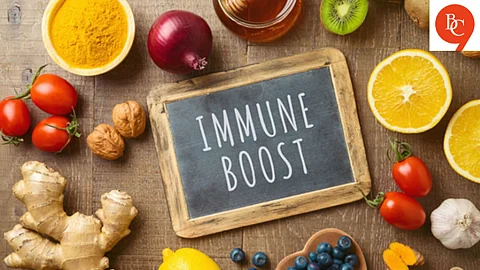7 Monsoon Superfoods That Boost Immunity
During this time, your body’s immune system works extra hard to defend against bacteria, viruses, and sudden weather changes. One of the simplest and most effective ways to support your immunity is through your diet.
Here are 7 monsoon superfoods you should include in your daily meals to stay healthy, energized, and infection-free this season.
1. Ginger (Adrak)
Why it works:
Ginger is a time-tested anti-inflammatory powerhouse that helps fight throat infections, boosts digestion, and keeps colds at bay.
How to consume it:
Add grated ginger to your chai
Mix with honey and lemon for a soothing immunity shot
Use in dals, soups, or stir-fries
2. Lemon (Nimbu)
Why it works:
Rich in vitamin C, lemon strengthens the immune system and flushes out toxins. It’s also great for improving iron absorption—essential for fighting fatigue and weakness during damp weather.
How to consume it:
Add to warm water with honey every morning
Squeeze over salads, khichdi, or roasted veggies
Use as a base for detox drinks with mint and cucumber
3. Mushrooms
Why it works:
Mushrooms like button, oyster, or shiitake are rich in beta-glucans, known to enhance the immune response. They also contain selenium and B vitamins, which support energy levels and cellular repair.
How to consume it:
Add to soups, pasta, or hot monsoon stir-fries
Try mushroom tikka or curry for a filling meal
Toss with garlic and olive oil for a healthy snack
4. Garlic (Lahsun)
Why it works:
Garlic contains allicin, a natural compound with antiviral, antifungal, and antibacterial properties. It’s a natural immunity booster that also keeps your gut clean—super important during monsoon season.
How to consume it:
Use freshly crushed garlic in dals, curries, and soups
Mix raw garlic paste with honey for a morning immunity shot
Infuse into ghee or oil for cooking
5. Apples & Pears
Why they work:
These seasonal fruits are packed with fiber, antioxidants, and vitamins. They improve digestion, reduce inflammation, and support healthy blood sugar—important for overall immune defense.
How to consume them:
Eat raw with skin (washed properly)
Bake them with cinnamon for a warming snack
Add to salads with walnuts or flaxseeds
6. Moong Dal (Green Gram)
Why it works:
Easily digestible and protein-rich, moong dal balances the digestive system and prevents bloating—common complaints during monsoon. It’s also packed with antioxidants, potassium, and folate.
How to consume it:
Make moong dal khichdi with turmeric and ghee
Try sprouted moong salad with lemon and mint
Use in dosas or cheelas for a light, protein-rich breakfast
7. Tulsi (Holy Basil)
Why it works:
Tulsi has been used in Ayurvedic medicine for centuries to boost respiratory health, fight infections, and reduce stress. It acts as a natural antibiotic and adaptogen—perfect for weather-related immune dips.
How to consume it:
Brew fresh tulsi leaves in warm water or tea
Add to kadha with ginger, pepper, and cloves
Chew 2–3 raw leaves every morning
Monsoon might be the most romantic and refreshing season, but it’s also a time when your body needs extra protection. The food you eat can either make you vulnerable—or help you thrive.


